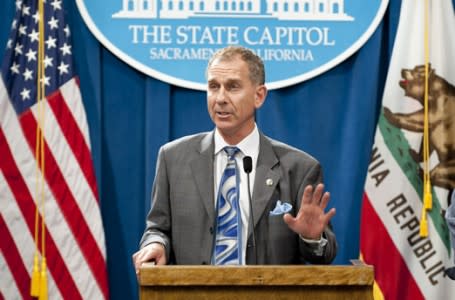The Constitution Outside the Courts: California Assemblyman Bob Wieckowski
Many Americans, not just the courts, help shape the meaning of the Constitution in the nation’s life. This series explains the actual or potential contributions of these other individuals, groups, or institutions.
Today’s Constitution-maker is a member of the California state legislature, Democratic Assemblyman Bob Wieckowski of Fremont, who led the effort to win passage of a bill to extend jury service to non-citizens who have a permanent legal right to live in the United States. Governor Edmund Brown is now considering whether to sign the measure into law.
The right to be tried by a jury is one of the most hallowed guarantees of the U.S. Constitution, and, indeed, of the Western legal tradition; it stretches back eight centuries to England’s Magna Carta.
The civic right to be a part of that tradition, to serve as a juror, is equally valued. The Philadelphia courts, for example, say on their website that “jury service is one of the highest duties of citizenship and it is an essential element of our democratic society.”
Although the Constitution does not say who may, or may not serve on juries, its Sixth Amendment does guarantee to those accused of crime that they will be tried by “an impartial jury.” Elsewhere in the Constitution, guarantees of legal equality have been interpreted to mean that a person facing criminal charges has a right to be tried by a jury of peers, and that means jurors cannot be excluded from service solely on the basis of race or gender, for example.
But, beyond that, it is up to the states and to Congress to decide who is eligible to become a juror. In Philadelphia, for example, the courts’ website instructs that “you must be a United States citizen at the time you are summoned” to be called for jury duty. That eligibility requirement is almost universal in this country.
California, however, appears to be on the verge of experimenting with giving non-citizens who are permanent legal residents of the state and the U.S. not only a right but a duty to be available for jury service in state courts.
Assembly Bill 1401 won final approval in the legislature September 9, and is now on the desk of Governor Edmund Brown. Political and legal observers in the state expect him to sign it into law, in coming days.
The idea, apparently, originated with Assemblyman Bob Wieckowski, who represents California’s District 25 in the legislature. He is the chairman of the Judiciary Committee, and he shepherded AB 1401 through his committee, and through to final enactment.
“Immigrants,” he said during floor debate last month, “are our friends. Immigrants are our neighbors. Immigrants are our co-workers and immigrants are our family members. They are part of the fabric of our community and they benefit from the protection of our laws.”
To avoid having his measure caught up in the sometimes angry debate over granting legal rights to foreign nationals who have entered the U.S. illegally, Wieckowski’s bill would open jury service only to non-citizens who have been granted a permanent legal right to be in and remain in the U.S. – a status governed by federal immigration law.
The bill says in its opening: “Existing law makes all persons eligible and qualified to be prospective trial jurors, except persons who, among other things, are not citizens of the United States. This bill would instead make a person eligible and qualified to be a prospective juror if, among other things, he or she is a lawful permanent immigrant.”
Even with that limitation, the bill was controversial, and remains so. Its most fervent critics argued that the presence of non-citizens will introduce into the American jury system individuals who lack an understanding of America’s values and who, as non-citizens, have no stake in governance.
It has long been true, of course, that the opportunity to serve on juries has been linked directly to the right to vote. Commonly, pools of potential jurors are assembled from the rolls of individuals who are registered to vote. Only citizens can vote, and there is no aspect of AB 1401 that would alter that fundamental requirement.
But Assemblyman Wieckowski is persuaded that there is a civic balance between, on the one hand, presence in the country and, with that, a right to full protection of the laws and, on the other hand, a duty to give back to civic life at least some form of service. He has argued, in fact, that “being a juror really has nothing to do with being a citizen.” He is persuaded that non-citizens, who have made the commitment to be Americans if not actual citizens, will bring to jury service the same kind of detachment that citizens regularly do out of the same sense of civic duty.
If his measure now becomes law in California, Assemblyman Wieckowski will have become a Constitution-maker, giving a deeply respected form of public service a more inclusive meaning.
Lyle Denniston is the National Constitution Center’s adviser on constitutional literacy. He has reported on the Supreme Court for 55 years, currently covering it for SCOTUSblog, an online clearinghouse of information about the Supreme Court’s work.


